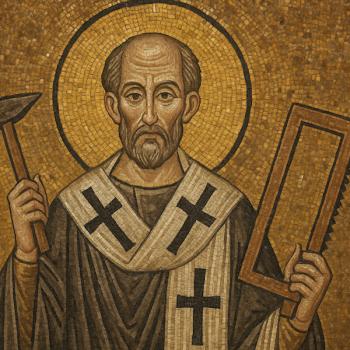Editors' Note: This article is part of the Patheos Public Square on Global Care: Why We Need More Than One Earth Day in a Year. Read other perspectives here.
On Easter, we celebrate God's greatest gift to us: his Son. During Holy Week, we retrace Jesus' steps as he entered Jerusalem, as he gave his last teachings to his disciples, as he suffered and died for forgiveness of sins, and as he rose again to make us, the spiritually dead descendants of Adam, alive again in Christ (Colossians 2:13).
This Easter, our little church in West Texas was bursting at the seams. Cars were parked all over the grass. People who hadn't entered the door of a church for 364 days joined Sunday regulars to celebrate God's greatest gift to humankind. To Christians, Easter is a vivid, annual, not-to-be-missed reminder of what we believe.
What did Jesus' sacrifice and resurrection accomplish, though? Is it no more than a once-a-year reminder that we've got a ticket to heaven when this world ends?
No: it is so much more than that. Jesus lived, suffered, died, and rose again so that we could live life to the fullest (John 10:10). He came to give us a new heart and a new spirit to carry with us, not just on Easter, but into every day of our year (Ezekiel 36:26).
Easter isn't about one Sunday a year. We need Easter every day, a daily reminder of God's free gift of forgiveness that allows us to forgive others (Ephesians 4:32) and God's love that enables us to love others (John 13:34). How else are we to live?
Hang on, though — isn't this supposed to be about Earth Day? What's the connection?
Here's the way I see it. On Easter, we celebrate God's greatest gift, his Son, who came to give us spiritual life, and all that life entails. On Earth Day, we celebrate God's second-greatest gift to us: this planet, which gives us our physical life.
Throughout the Bible, God emphasizes the importance of the incarnation. Did Jesus have to become flesh? No — but he did (John 1:14). Do we even have to have physical bodies? Some may argue, possibly not (John 3:6) — but we do. God attaches an importance to this physical body we live in, and values this physical planet he created for us (Genesis 1).
So unless we're one of the few who've signed up for that trip to Mars, this earth is the only home we have. And what a home it is — a blue, green, and white marble set in the black vastness of space, teeming with incredible diversity and all the resources needed for life. An atmosphere carefully balanced by a natural blanket of heat-trapping gases that keeps us at the perfect temperature for life.
Carefully balanced, that is, until we humans figured out how to dig all the coal, oil, and natural gas out of the ground and burn it, releasing massive amounts of carbon dioxide into the atmosphere — carbon dioxide that is now wrapping an extra, artificial blanket around the Earth. A blanket that was never intended to be there. And just like we overheat when we have too many blankets on, the Earth is overheating now too.
We know that natural forces, like the sun, or natural cycles (remember those Ice Ages?), have changed our climate in the past and are likely to change it again in the future. We know that we can't control these forces: they are firmly in the domain of God. But we also know that today, if climate were changing due to the sun or natural cycles, we'd be getting cooler, not warmer. Rising seas, melting glaciers, northward-moving bugs and pests, and thousands of other lines of evidence from God's creation all bear witness to the rapid warming that has occurred since the beginning of the Industrial Revolution, and the impacts this warming is having on our planet and on the people who live on it.
Already, more than one out of every ten people in the world do not have access to clean water. As climate changes, our rainfall patterns shift and our water resources become less reliable. One out of every nine people does not have enough food to eat. As climate changes, growing seasons change and the yields of many of the world's major crops decline. And one out of every six does not have electricity. But as climate changes, our fossil fuel-based energy grid becomes less reliable and more prone to outages during heat waves and droughts.
We don't just care about climate change because of polar bears or people on low-lying Pacific islands. We care about climate change because it affects people all around the world, and that includes real people, here, today. Not only that, but it disproportionately affects those who already struggle to get by, the very people we as Christians are told to remember (Galatians 2:10).
Such a global problem seems hopeless, though — what can I, one person, do?
The good news is that there is a lot we can do. As an individual or a family, we can measure our carbon footprint. Where is all this stuff coming from anyways? Once we know where our carbon emissions are coming from — commuting? eating a lot of red meat? wasting energy? — we can work together make small, sensible choices that save us money, express Christ's love to others, and, when they're all added up together, can make a big difference. Just for example: did you know that if every household in the U.S. replaced just one old-school incandescent light bulb with a new LED, not only would we each save about $30 in energy over the lifetime of the bulb, but that would be like taking nearly a million cars off the road?




